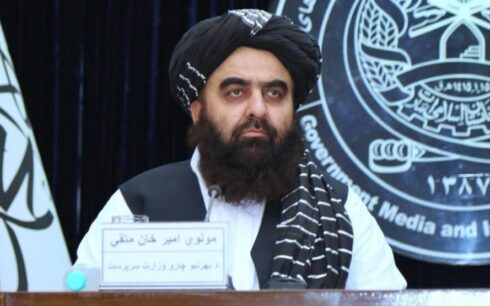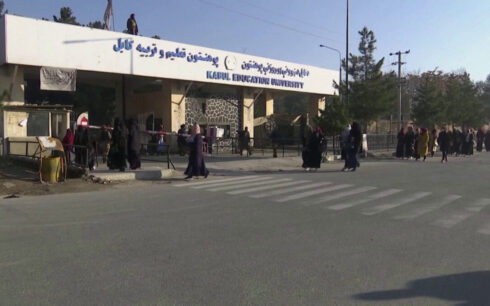Opium in Nimroz province in western Afghanistan is now 12 times more expensive than it was a year ago – before the Taliban issued a ban on poppy cultivation, sources told Amu TV.
According to the sources, the Taliban has driven up the price – in fact the group, along with drug traffickers, have a set price list on the walls of markets for opium in the province.
The sources, who are familiar with the matter, said trade in opium is conducted in accordance with the price lists. In addition, the tax on one kilogram of opium is now hundreds of afghanis.
The price has increased by over 100%, from 60,000 Pakistani rupees ($216) to 120,000 rupees ($432) per kilogram.
After the Taliban took control of Afghanistan, the group’s leader Mullah Haibatullah Akhundzada issued a decree banning poppy cultivation. The Taliban then destroyed poppy cultivations in Helmand, Nimroz, Kandahar, and Farah provinces which led to an increase in the price of opium.
Haji Fath-ud-din, a landowner who used to cultivate opium in the Khashrud district of Nimroz province, told Amu TV that the Taliban are not honest regarding their ban on poppy cultivation and drug production. He said the group earns money by pushing up the market price of opium.
According to him, poppy cultivation was the main source of income for the Taliban before the collapse of the former government. He said now that it’s banned, the group gets money from the central bank of Afghanistan and the international community through cash aid and no longer relies primarily on money from drugs – therefore they have stopped some of the cultivation of poppies, he said.
Fath-ud-din claimed that the Taliban used to get 30 percent of the revenue generated from his 10 acres of land that was cultivated with poppies. But now that there is a ban in place, he claims they destroyed his fields.
“The Taliban destroyed 10 acres of my lands last year because they could not take a share themselves,” he said.
Regarding the surge in the price of opium, Haji Fath-ud-din said: “After poppy cultivation was banned, and opium became scarce, its price increased compared to [the price under] the former government. Before, one kilogram of opium was 60,000 Pakistani rupees ($216), but today it has reached 120,000 rupees ($432).”
A source meanwhile stated that the Taliban are benefiting from an increase in the price of opium. The group has also increased taxes on opium, from 600 Afghani to 800 Afghani for each kilogram that is trafficked via the Kang border to Iran.
Sediqullah, a drug trafficker, said that the Taliban plays a key role in driving up the price of opium. According to him, the group banned the cultivation of poppies in order to “whitewash” their government in the eyes of the international community, but in reality, they push up taxes on opium traffickers to make more money.
Sediqullah added that the Taliban banned the cultivation of poppies, but did not stop the traffickers. He said the Taliban tell the traffickers what the price is.
According to him, the Taliban and smugglers publicly set prices for opium in the Miwand market in southern Kandahar province. They put up price lists on the walls of the markets that show an increase in the price of opium from 104,000 rupees to 120,000 rupees, Sediqullah said.
“The opium market is not controlled by foreigners; it is in the hands of domestic smugglers. If 10,000 kgs were sold per day, the reserves of the landowners will be decreased and then they stop selling, hoarding occurs in this case and the price will increase. A few days after no purchase happened, they will decrease the price again,” he added.
The drug traffickers are in contact with each other and when a smuggler buys opium at a low price in a village, he informs the others via WhatsApp, and then the price list will be prepared based on that.
Jawid, who has been trafficking drugs from the bazaar of Bakwa district in Farah province to Zaranj city of Nimroz for the past 10 years, said: “During the republic [government], opium cultivation took place in areas under the control of the Taliban, and the government forces did not have access to those areas. The Taliban set the price of opium as it did in the past.”
According to him, the opium price was three million Iranian Tomans (10,000 AFN), but a month ago it was 15 million Tomans (37,000 Afghanis), and in the last week, the price of opium suddenly increased to 25 million Tomans (54,000 AFN).
Jawid stated that the smugglers buy one kilogram of opium from Bakwa and Khashrud for 18 million Tomans (39,000 AFN) and sell it for 20 million Tomans (44,000 AFN) in Nimroz province.
The smugglers also pay 800 afghanis in tax to the Taliban. And then they sell to Iranian smugglers on the other side of the border for 25 million Tomans (54,000 AFN), he said.
He added that the drug is then sold in Tehran for 30 million Tomans (66,000 AFN) per kilogram, before being sent on to Europe.
Jawid noted that opium is scarce now and landowners are stockpiling their harvests, in the hope of getting the price to be in their favor.
Drug smugglers, meanwhile, stated that there are many types of opium locally, known as khurmayi, saori, and black. Khurmayi opium is the best in quality that is grown in Bakwa.
Bakwa district in Farah had the largest area under opium cultivation during the former government’s tenure, although the district had been under Taliban control. Amu tried to get comment from the Taliban on the situation but failed to reach Gul Mohammad Qadrat, Nimroz police spokesman, and Habibullah Elham, the head of information and culture directorate of the Taliban for the province.





